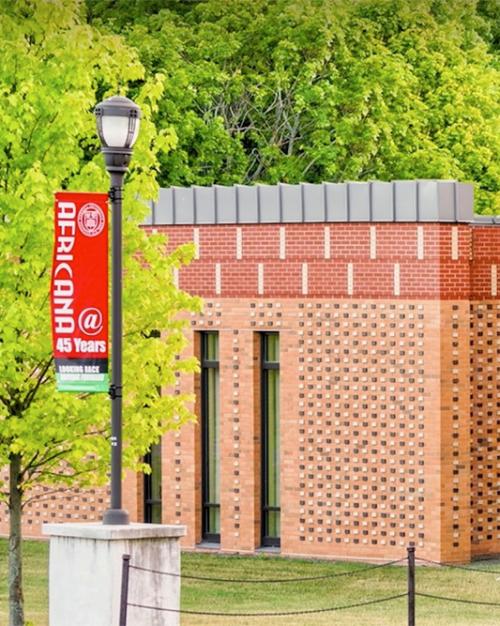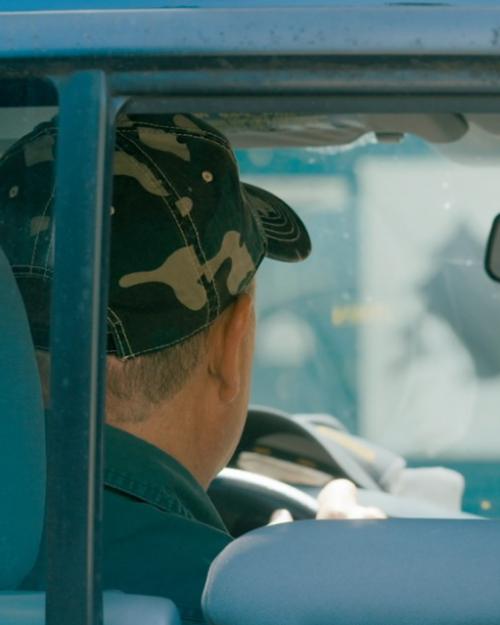A trio of short films showing the pleasures – and perils – of rural life for LGBTQ+ people will show April 26 as part of the Rural Humanities Initiative in the College of Arts and Sciences.
The three works created by Austin Bunn, associate professor of performing and media arts, include “Campfire,” which premiered last month, as well as “Lavender Hill” and “In the Hollow.”
“OUT HERE: 3 Short Films About Rural LGBT Life,” will take place at 5:30 p.m. at Cinemapolis, 120 E. Green St., and will feature a post-show Q&A with guests from each film, David Hirsch (“Lavender Hill”), Claudia Brenner (“In the Hollow”) and Wayne Mitteer (“Campfire”), facilitated by Gerard Aching, Cornell’s W. E. B. DuBois Professor in the Humanities and director of the Rural Humanities Initiative.
The films have screened variously at Outfest (Los Angeles), Inside Out (Toronto), Cleveland Film Festival, Provincetown International Film Festival, Sidewalk, Shortoftheweek.com and elsewhere. Admission is free and the event will be followed by a reception at Moosewood Restaurant in DeWitt Mall.
“For LGBT folks, moving to cities is the common trajectory – for safety, for professional growth, for love,” said Bunn, an award-winning filmmaker who co-wrote “Kill Your Darlings,” as well as feature screenplays and television pilots for Fox 2000, Lionsgate, Participant Media and Tomorrow Studios. “But this was always a tradeoff – leaving wilderness behind to become ourselves in the urban wild. These films show and try to honor the ways that LGBT people have reclaimed that right to land, to nature, and to self-discovery in the woods.”
“Campfire,” Bunn’s newest film, tells the story of a married dairy farmer who travels to a gay campground in the Endless Mountains of Pennsylvania to find his long-lost love. A blend of narrative film and documentary, the film features interviews and performances by non-actors and residents of the Hillside Campground in New Milford, Pennsylvania.
Bunn traveled to the campground in 2019 and enjoyed his stay, deciding to make a documentary about it in 2022.
“There are 30-some LGBT campgrounds in America – a phenomenon that started in the 1980s at the height of the AIDS epidemic,” he said. “Hillside has been a kind of refuge for urban gay men since in 1986,when it was founded, but it’s also an important meeting place for the rural community around it.”
As he started doing interviews, Bunn struggled with how to tell the story of the campground and still maintain privacy for its residents. Then, he got a phone call from a man who introduced himself as a friend of his father, who had died in 2018, when they both served in the Air Force in the late 1950s.
“He told me that they had been lovers for two years – in secret because of the military ban on homosexuality, and that my dad had been the love of his life,” Bunn said. “He had just read my dad’s obituary and sought me out. He’s 83 now and just wanted someone to know about this relationship.”
Bunn said he took those feelings – “a long lost love, a quest, a man searching for someone who turns out to be himself” – wrote the script quickly and then set about blending the documentary material into the narrative. The film features six resident campers who are not actors, two professional actors and dozens of Hillside campers as extras.
Aching said showing all three films together will allow viewers to be informed, affected and moved in multiple ways.
“Our projects, like these films, require researchers to be good listeners and community partners,” he said. “In contrast to the ways in which urban settings are typically represented as the places where LGBT communities are more numerous and tend to feel more supported, these films capture the joys, dangers, aspirations and complexities for these communities of being at home in or traveling through rural parts of America.”
Hirsch, a member of the Lavender Hill community, said the story of the West Danby commune was an important one to tell because "it's a little postcard of the time, with its roots in the hippie counterculture era," he said. "One thing that was unique about us is that we were gay men and lesbian women living together. That was definitely not something you would see so much."
Mitteer, one of the principles of the 330-acre Hillside Campground, said Bunn was careful to respect privacy, but tell true stories of the importance of the campground to many people's lives.
"As time moves on, people tend not to understand the story of what that campground really represented, the struggles that people were having when it first opened and how it was a place of refuge and safety for all kinds of men," said Mitteer, who has had a site at Hillside since 1989. "Today it's so much easier with a lot more freedoms, the recognition of same-sex marriage. But we don't take it for granted."
Although he didn’t plan to create a trilogy on rural LGBTQ life, Bunn said he is excited to share these films together as part of the Rural Humanities Initiative.
“There is something truly powerful about seeing your community, your place, your people reflected on the big screen,” he said. “All too often, film culture is about elsewhere – Hollywood, New York City, etc. But film is local too and can be vital way to honor and celebrate quieter, complex stories of sacrifice, change and connection.”





